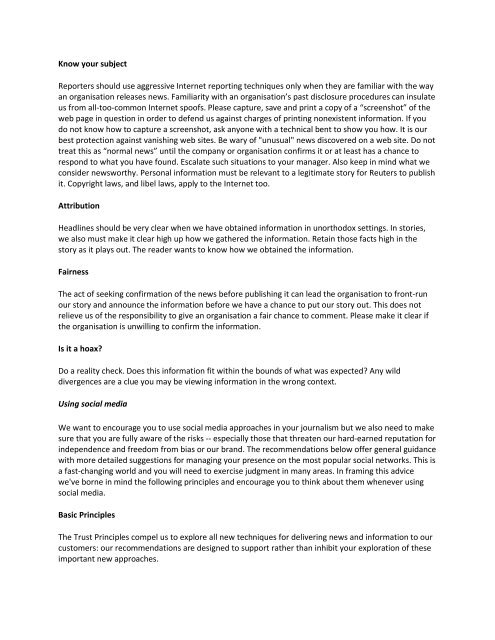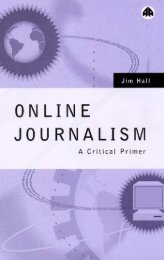Modul Mata Kuliah Journalisme Online - Ayo Menulis FISIP UAJY
Modul Mata Kuliah Journalisme Online - Ayo Menulis FISIP UAJY
Modul Mata Kuliah Journalisme Online - Ayo Menulis FISIP UAJY
Create successful ePaper yourself
Turn your PDF publications into a flip-book with our unique Google optimized e-Paper software.
Know your subject<br />
Reporters should use aggressive Internet reporting techniques only when they are familiar with the way<br />
an organisation releases news. Familiarity with an organisation’s past disclosure procedures can insulate<br />
us from all-too-common Internet spoofs. Please capture, save and print a copy of a “screenshot” of the<br />
web page in question in order to defend us against charges of printing nonexistent information. If you<br />
do not know how to capture a screenshot, ask anyone with a technical bent to show you how. It is our<br />
best protection against vanishing web sites. Be wary of "unusual" news discovered on a web site. Do not<br />
treat this as “normal news” until the company or organisation confirms it or at least has a chance to<br />
respond to what you have found. Escalate such situations to your manager. Also keep in mind what we<br />
consider newsworthy. Personal information must be relevant to a legitimate story for Reuters to publish<br />
it. Copyright laws, and libel laws, apply to the Internet too.<br />
Attribution<br />
Headlines should be very clear when we have obtained information in unorthodox settings. In stories,<br />
we also must make it clear high up how we gathered the information. Retain those facts high in the<br />
story as it plays out. The reader wants to know how we obtained the information.<br />
Fairness<br />
The act of seeking confirmation of the news before publishing it can lead the organisation to front-run<br />
our story and announce the information before we have a chance to put our story out. This does not<br />
relieve us of the responsibility to give an organisation a fair chance to comment. Please make it clear if<br />
the organisation is unwilling to confirm the information.<br />
Is it a hoax?<br />
Do a reality check. Does this information fit within the bounds of what was expected? Any wild<br />
divergences are a clue you may be viewing information in the wrong context.<br />
Using social media<br />
We want to encourage you to use social media approaches in your journalism but we also need to make<br />
sure that you are fully aware of the risks -- especially those that threaten our hard-earned reputation for<br />
independence and freedom from bias or our brand. The recommendations below offer general guidance<br />
with more detailed suggestions for managing your presence on the most popular social networks. This is<br />
a fast-changing world and you will need to exercise judgment in many areas. In framing this advice<br />
we've borne in mind the following principles and encourage you to think about them whenever using<br />
social media.<br />
Basic Principles<br />
The Trust Principles compel us to explore all new techniques for delivering news and information to our<br />
customers: our recommendations are designed to support rather than inhibit your exploration of these<br />
important new approaches.
















